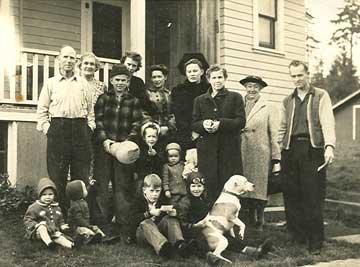O’Gust (Olaf August) Johnson left his wife and small daughter in Sweden to seek a fortune in the United States. He worked in the silver mines in Alaska after the Gold Rush, and earned enough to buy land and send for his family, but on the way back to Seattle, someone stole his moneybag while he slept. Johnson never got off the boat, but returned to the mines to earn the money all over again.
 The 1941 Thanksgiving at the Johnson grandparents' home. Left to right, standing, O'Gust and Hilda Johnson, Vernal Hyde, Ruth Johnson, Jeanette Anderson, Edyth Jphnson, Grandma Strom, Stanley Anderson. Standing children: David and Karen Anderson Sitting: Esther Johnson, Don Johnson, Ernie Johnson, Loren Hyde. Photo courtesy Johnson Family
The 1941 Thanksgiving at the Johnson grandparents' home. Left to right, standing, O'Gust and Hilda Johnson, Vernal Hyde, Ruth Johnson, Jeanette Anderson, Edyth Jphnson, Grandma Strom, Stanley Anderson. Standing children: David and Karen Anderson Sitting: Esther Johnson, Don Johnson, Ernie Johnson, Loren Hyde. Photo courtesy Johnson Family
Johnson had learned some English, but wife Hilda had not. He had to leave her alone when he went to work in Tacoma. The family story says she asked him what she should do if someone came to the door. He said, “Say you don’t speak English and I’m not home.”
Sure enough, someone knocked on the door. Hilda opened it, said, “You don’t speak English and I’m not home!” The visitor departed.
Johnson, who wanted a farm in the country, bought land about 1905. He raised chickens and eggs. His sister, Bertha, and brothers Hilmer and John arrived later.
Four sons were born: Ragner, Ernest, George, and another who died young. Ragner, tired of being called Rag changed his name to Rogner. His first job, as a teen, was whistle punk with a steam donkey, but he was around when horse logging was still being done. He was the first bulldozer operator on the peninsula, working for Davidson Logging Co.
Rogner was hired to do cleanup work for Mr. Strom. When he went to collect his pay, he met Strom’s daughter, Edyth. She moved to Longbranch from Dabob on her 16th birthday. They were married for nearly 40 years, and raised three children, Esther, Bob, Phil, and Dave.
Rogner and family were out of the area during World War II, and when they returned, traded their Longbranch house for his parents’ home, as Grandma Johnson didn’t enjoy living by the water, where they’d lived in the original Ulsh home.
Rogner partnered with logger John Larson until the late 1950s, then started Johnson Bulldozing Co., later changed to Lakebay Construction Co. Sons Phil and Dave bought their dad out in 1975, and continue to operate, mainly building bulkheads. Bob did commercial fishing, then had a sawmill on the homes property by the water. When bulkhead building required removal of large trees, the logs were moved to Bob’s mill for processing.
Esther, Phil, mother Edyth, and cousin Beverly reminisced about the old days at Grandpa Johnson’s farm.
“All the Swedes came out to make hay,” said Beverly, “and Grandma cooked for everybody. She had a copper washtub full of potatoes.”
On Sundays, everybody dressed up and went on picnics. “People got together then,” said Beverly.
Grandma started her lutefisk the second week of December for the family Christmas Eve. “It took six months to get all the tarnish off the silver from the lutefisk,” Esther said. “The kids all ate blutpalsa (blood sausage) until they were big enough to know what it was made of, then they graduated to potato palsa.”
Phil recalled watching his grandfather stir a big pot on the stove, and asked what it was. “Chocolate,” said Grandpa, and spooned out a sample for Phil. “That’s the worst chocolate I’ve ever tasted,” said Phil, and learned it was blutpalsa being cooked.
“Grandpa was the most serious of his family, but did have a sense of humor,” Esther said.
Farmer, logger, bulldozer operators, three generations of Johnsons have made their impact on the peninsula.
UNDERWRITTEN BY THE FUND FOR NONPROFIT NEWS (NEWSMATCH) AT THE MIAMI FOUNDATION, THE ANGEL GUILD, ADVERTISERS, DONORS AND PEOPLE WHO SUPPORT INDEPENDENT, NONPROFIT LOCAL NEWS